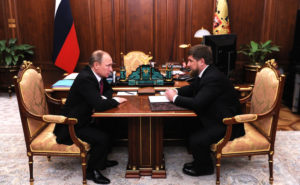Fundamentally American Activities
This is about men doing away with those general laws to which they themselves will need recourse in their day of adversity, how moderation became mistaken for cowardice, extremism for courage, and how words lost their meaning. This is about men doing away with those general laws to which they themselves will need recourse in their day of adversity, how moderation became mistaken for cowardice, extremism for courage, and how words lost their meaning.

United States Air Force
Dear all who responded to my article, no matter if you agreed or not:
Thank you! I enjoyed being part of the conversation, especially the recent prank caller (traced to Orange County) who called me a spy. You were my favorite!
Overwhelmingly, the response to “The Long Telegram” was great and beyond my expectations.
The main objection, however, was that I am “too kind toward Russia.” Well I have not joined the choir of condemnation, based on the fact that I am not a Russophobe (it would be odd and unhealthy if I were) and for the first time in my life I agree with Henry Kissinger: “Putin vilification is not a strategy.” What it is though is a guarantee that Vladimir Putin will be office for another decade — which I deeply regret. No one should hold high office that long.
Russia bashing has been the leading news cycle in the U.S. and the West, so I was confident that that has been covered. I am not confident though that it had worked on anyone informed (how the propaganda calculus goes regarding informed vs not, I do not know). Naturally, in Russia, the response to smearing Russia did not go over well, neither does that kind of treatment have support among thinking people and politicians. Three former German chancellors have come out and criticized the current Western policy. Gregor Gysi of the German Die Linke (The Left) party condemned the United States, Russia and above all the EU for fostering the conflict.
It is a glaring fact that 93 percent of Crimea’s voters demanded to be back in Russia’s fold as they had been for over 200 years. They—nearly all—want it; all Russians want it. Crimea is not Estonia or Kazakhstan. This is their choice. Tariq Ali of The Guardian put it best in his essay “How Vladimir Putin became evil”: “The Crimean affair led to barely any loss of life, and the population clearly wanted to be part of Russia. The White House’s reaction has been the opposite of its reaction to Chechnya. Why? Because Putin, unlike Yeltsin, is refusing to play ball.”
Other commenters brought up the sovereignty issue. Someone was even delighted to mention Stalin. If we start that discussion and comparisons, we could also go all the way back to the biggest land grab in history (North America), one of the largest genocides in history (of the Native American Indians), and the past role of slavery in the United States. We could also include recent history as everyone without amnesia has done. You cannot possibly make objections to the Crimea situation after the U.S. bombed Serbia for 72 days, invaded Iraq, has Joint Special Operations Command units in 75 or so countries, and eavesdrops on everyone from German Chancellor Angela Merkel to Russian Prime Minister Dmitry Medvedev. Hello, NSA, you too can join the discussion! International law either goes for everyone or it goes for nobody. That is the whole point of having a law.
Crisis Control Delusion
The U.S. has been “playing the field,” which is the world, through backing dubious groups to the good willing NGOs in order to unsettle political realities it finds objectionable and not in its interests. Does it really work? The game in Ukraine started long before, as Victoria Nuland, assistant secretary of state for European and Eurasian affairs, acknowledged that the U.S. has spent $5 billion to support “the Ukrainian democratic movement.” Max Blumenthal’s article “Is the US Backing Neo-Nazis in Ukraine?” documents anti-Semitic, racist, neo-fascist and ultra-nationalist parties benefiting from the current situation in Ukraine, including the Svoboda (“Freedom”) party—a fascist group working closely with another—the Right Sector—a nationalist party. Svoboda and the Right Sector comprise two out of three leading political forces in Western Ukraine now.
Although the first demonstrators at Kiev’s Maidan square were, indeed, pro-reform, the ones who took over were an entirely different type of individual. Jack Matlock, the former ambassador to Russia under Ronald Reagan, asked prudently last week, “How would we feel if Occupy Wall Street was funded by the Russians?” Those good American sages like diplomats George Kennan and Jack Matlock, scholar Stephen Cohen — they don’t make them like that anymore. If you do not want something done to you, do not do it to others. Every action will have a reaction is the law of physics and human relations. No sophisticated armament can upset that basic nature of the world.
Blowback
Iraq was once a semi-secular autocracy with one of the highest rates of education in the Middle East and it had a repugnant man as its head of state. Yet it was in an on-again off-again war with Iran and it had no al-Qaida. It now does, and so does Syria. And, now, the Iranian government is unchecked (I read in The New York Review of Books that it was most grateful to us) and Iraq is a failed state. The former Yugoslavia has become a narco state and I hear that human organ trafficking is doing good business there. Afghanistan is mostly overrun by the Taliban and, the analysis has it, is far more radicalized than before the war. The delusion that one can control these situations has horrific consequences for the people on the ground, not for the “bright bulbs” who come up with those “ideas.”
Those people on the ground retaliate as they would according to that basic law of reaction. The CIA has a term for it: “blowback.” I have a better term for it: “catastrophic.” In a day when weapons and their delivery are democratized and opposing the West and the U.S. is mythologized in epic terms, destabilizing other states is dangerous. The most interesting case was of the accused Boston Marathon bomber Tsarnaev brothers. Russia’s FSB (KGB) warned the FBI about them, but the U.S. concluded that it was not its problem. They were Chechens, so they were likely to hit Russia, not us, who cares. How did that end? In a horrific tragedy. Threats are globalized and they can and do have enormous consequences. States have to work together on stabilizing—not destabilizing—situations.
Information control delusion
We think that we can play power games and nobody will know. How bizarre that after WikiLeaks, this thought is still even a part of the mentality. It is understandable that a country presents itself in a good light, but it has to be plausible. Otherwise it comes close to comical. I much prefer the Japanese and German way of self-presentation without affectation. They are what they do without much ado about it; they learned from history. Beautiful. The most astonishing thing in the reactions to my article was the silence or indifferent shrugging about the weekly beheadings in Saudi Arabia, including for “crimes” of apostasy and sorcery. It was as if I attacked a quaint local custom and ought to feel awkward about it. I put it to you that public decapitations are different from Greek dancing, henna hand paintings and yodeling.
Russia strategy
The United States looked at the map and missed a country the size of an ocean, which has every ugly weapon ever invented, every resource including every element in the Mendeleev chemical table, and decided to ignore the fact that it exists except to once in a while do some Russia bashing. The truth is that urban Russia is highly educated, profoundly pro-American and sees itself as part of the world and it is (take a look at every major university, symposium, laboratory, orchestra, opera house, art museum, not to mention ballet). Now, the urban society that disliked Putin has joined the provinces and many urbanites are backing him. Thank you again, geniuses!
The ones who have no shame
And here is the rub: We think that people who simply call themselves here “intellectuals” and are working in places called “think tanks” (note the word “think” in it) are smart. Not really. Why do people who ruined America’s image and standing in the world think their opinions are welcome? Those who had undermined the most basic rules and laws of society including habeas corpus — the very foundation of the law — why are they talking?
We think that people who beat their chests and say they are patriots are good for the country. Very rarely. We think that defense contractors are a good compromise in a dangerous world without army conscription. Wrong. The interests of the American defense contractors and the military-industrial complex are at grave odds with the interests of their client — the U.S. taxpayers. Conflicts and wars are good business for those corporations, organizations, “think tanks” et al. but they are deadly for the people of this country and of the world. If conflicts and wars are the very point of those Ukrainian games, if they are the true goals, the feast for the beast, then let us say it.
My friend Herb Golder, a classics professor at Boston University, said of “The Long Telegram”: “Reading the second page it occurred to me that you should have a look at Thucydides, especially the Corcyrean excursus where he writes about men doing away with those general laws to which they themselves will need recourse in their day of adversity, how moderation became mistaken for cowardice, extremism for courage, and how words lost their meaning.”
On that note, my best to all.
Lena
As we navigate an uncertain 2025, with a new administration questioning press freedoms, the risks are clear: our ability to report freely is under threat.
Your tax-deductible donation enables us to dig deeper, delivering fearless investigative reporting and analysis that exposes the reality beneath the headlines — without compromise.
Now is the time to take action. Stand with our courageous journalists. Donate today to protect a free press, uphold democracy and uncover the stories that need to be told.






You need to be a supporter to comment.
There are currently no responses to this article.
Be the first to respond.